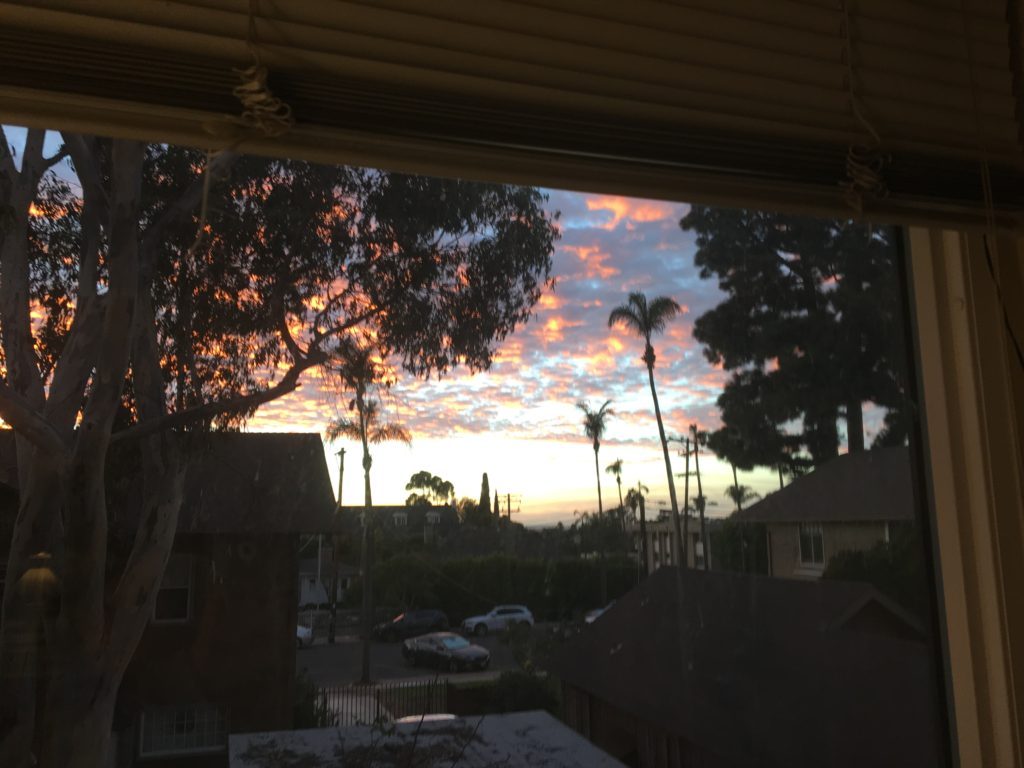
As I write this I can raise my sight to a California Autumn sky over the Pacific with a carpet of incandescent orange-red clouds that would have sent JMW Turner running to his paintbrushes, or just deciding that there was no human capacity to replicate Nature’s almost unbelievable beauty. In a few minutes it will be gone, and the clouds a tenebrous preamble to incipient evening and inky night.
The sunset was so arresting and ephemeral that I quickly took an iPhone shot of it to text to my daughters, but the photo would not capture the rich, saturated magnificence of the priceless event.
What it did do, however, is provoke me to contemplate, like some Ruskinesque aesthete, or Keats looking out of his Piazza di Spagna flat at the Roman sky and struggling to get lines down between consumptive gasps that were as ephemeral as the changing light, a notion of the essence beauty and whence it derives.
It’s just atmospherics—light, temperature, optics, pattern, symmetry—that could be scientifically described with a precision that would render nothing—perhaps even diminish—the emotional jolt that Nature can deliver, not just at a glorious sunset, but, if we are open to it, in a myriad ways—a sunrise, a storm, the crash of a wave, the giggle of a little girl, or her fetching smile when she is as ripe as a vineyard turning to purple light by the morning sun (or a bottle of Chateau Lafite), of Bill Evans playing Stella by Startlight, a first kiss, a perfect cappuccino, or a winning jump-shot at the buzzer —well, you get the idea (if you don’t, stop reading).
So my question—to my self as much as to you, reader—is whether we humans have evolved to recognize—as pleasurably beautiful—that we recognize and identify as beautiful. Is it derivative of our senses? Or, are they merely the conduits to some aesthetic capacity that has evolved in our brains? Does the essence of beauty reside in its object, in the poetic phrase, the juxtaposition of brush strokes, the harmonics of a musical chord, or the rustle of a copse of bamboo in a summer breeze? Or, is beauty unique to our Earth? Could the rusty winds of Mars, or desolate moonscapes of foreign worlds ever be as beautiful (or rather repugnant) as “home?”
What is your idea of beauty? Is it merely subjectively in the “eye of the beholder?” Is it uniquely human? Would life be endurable without it? Why am still thinking about last evening’s sunset? I need to know. Comment.

3 comments
And did that sunset calm you, bring a moment of peace from the world’s craziness, and still give you a sense of wonder?
Rabbi Abraham Joshua Heschel, Man is not Alone, 1951
“As civilization advances, the sense of wonder declines. Such decline is an alarming symptom of our
state of mind. We will not perish for want of information; but only for want of appreciation. “
This may help: https://www.scientificamerican.com/article/the-neuroscience-of-beauty/
As for me, I think that because every human is different in upbringing, beauty to each could be summed up as ‘whatever floats yer boat’.
It’s your concept of heaven, the clouds in the sky. It reminds you of paintings you see on the ceilings in Vatican.
Corlor wise, its very subjective what one would consider as incomparable beauty.
Comments are closed.